#they live so long.. centuries.
Text



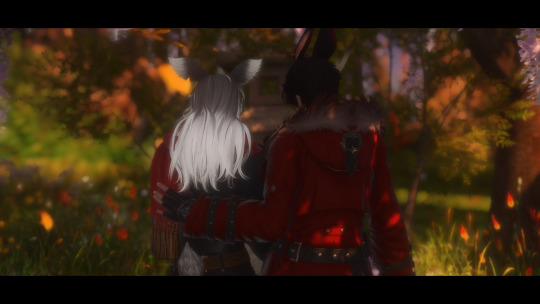
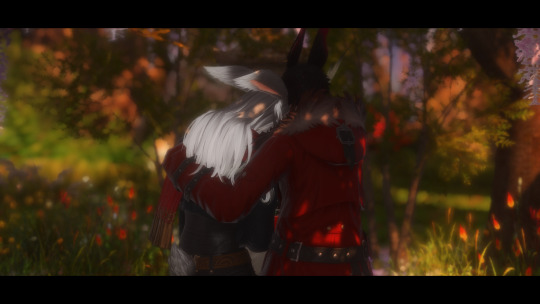


『FUTURE』
[The eternal struggle with living a long life: loss.]
⋆⁺。˚⋆˙‧₊☽ ◯ ☾₊‧˙⋆˚。⁺⋆
[VIERAPRIL2024]
#ffxiv#ffxiv oc#nira'sae#minasha#gpose#this has plagued me ever since nira'sae became a viera.#they live so long.. centuries.#what of their loved ones? the ones that can't possibly keep up?#like one redhaired catboy they'll care for until his dying day?#food for thought and also pain.#vierapril2024#vierapril 2024
33 notes
·
View notes
Text
the fact that shakespeare was a playwright is sometimes so funny to me. just the concept of the "greatest writer of the English language" being a random 450-year-old entertainer, a 16th cent pop cultural sensation (thanks in large part to puns & dirty jokes & verbiage & a long-running appeal to commoners). and his work was made to be watched not read, but in the classroom teachers just hand us his scripts and say "that's literature"
just...imagine it's 2450 A.D. and English Lit students are regularly going into 100k debt writing postdoc theses on The Simpsons screenplays. the original animation hasn't even been preserved, it's literally just scripts and the occasional SDH subtitles.txt. they've been republished more times than the Bible
#due to the Great Data Decay academics write viciously argumentative articles on which episodes aired in what order#at conferences professors have known to engage in physically violent altercations whilst debating the air date number of household viewers#90% of the couch gags have been lost and there is a billion dollar trade in counterfeit “lost copies”#serious note: i'll be honest i always assumed it was english imperialism that made shakespeare so inescapable in the 19th/20th cent#like his writing should have become obscure at the same level of his contemporaries#but british imperialists needed an ENGLISH LANGUAGE (and BRITISH) writer to venerate#and shakespeare wrote so many damn things that there was a humongous body of work just sitting there waiting to be culturally exploited...#i know it didn't happen like this but i imagine a English Parliament House Committee Member For The Education Of The Masses or something#cartoonishly stumbling over a dusty cobwebbed crate labelled the Complete Works of Shakespeare#and going 'Eureka! this shall make excellent propoganda for fabricating a national identity in a time of great social unrest.#it will be a cornerstone of our elitist educational institutions for centuries to come! long live our decaying empire!'#'what good fortune that this used to be accessible and entertaining to mainstream illiterate audience members...#..but now we can strip that away and make it a difficult & alienating foundation of a Classical Education! just like the latin language :)'#anyway maybe there's no such thing as the 'greatest writer of x language' in ANY language?#maybe there are just different styles and yes levels of expertise and skill but also a high degree of subjectivity#and variance in the way that we as individuals and members of different cultures/time periods experience any work of media#and that's okay! and should be acknowledged!!! and allow us to give ourselves permission to broaden our horizons#and explore the stories of marginalized/underappreciated creators#instead of worshiping the List of Top 10 Best (aka Most Famous) Whatevers Of All Time/A Certain Time Period#anyways things are famous for a reason and that reason has little to do with innate “value”#and much more to do with how it plays into the interests of powerful institutions motivated to influence our shared cultural narratives#so i'm not saying 'stop teaching shakespeare'. but like...maybe classrooms should stop using it as busy work that (by accident or designs)#happens to alienate a large number of students who could otherwise be engaging critically with works that feel more relevant to their world#(by merit of not being 4 centuries old or lacking necessary historical context or requiring untaught translation skills)#and yeah...MAYBE our educational institutions could spend less time/money on shakespeare critical analysis and more on...#...any of thousands of underfunded areas of literary research i literally (pun!) don't know where to begin#oh and p.s. the modern publishing world is in shambles and it would be neat if schoolwork could include modern works?#beautiful complicated socially relevant works of literature are published every year. it's not just the 'classics' that have value#and actually modern publications are probably an easier way for students to learn the basics. since lesson plans don't have to include the#important historical/cultural context many teens need for 20+ year old media (which is older than their entire lived experience fyi)
24K notes
·
View notes
Text
Thinking about a bingqiu Dreamling AU where Shen Yuan and Shang Qinghua are both bored deities, just sort of taking a brief sojourn through the mortal world to shoot the shit and see some interesting monster or other that Shen Yuan has heard about, when they come across a tea house and decide to take a break and do some people-watching instead.
Shen Yuan is well into something of a shut-in phase, which Shang Qinghua doesn't like, mostly because when Shen Yuan is in those phases he doesn't do particularly well either. Shen Yuan's a social butterfly, for however little he cares to actually acknowledge it about himself, and his critique of Shang Qinghua's literary masterpieces gets so much harsher when he's not getting enough enrichment.
So when they overhear one of the kitchen boys solemnly insisting that he is going to do everything in his power to never die, and Shen Yuan laments that the boy would probably regret such a wish if it came true, Shang Qinghua decides to bestow a rare bit of godly power onto this mortal and grant his wish.
He doesn't make him a god, of course, that wouldn't even be in his ability. At least, not without using up more time and effort than he's prepared to expend on this one random kid. But immortality on its own is not that difficult. The boy will still finish growing up, and will still be able to be harmed, to know hunger and pain and illness. It just won't ever kill him.
Shen Yuan sighs that it's a cruel thing to do to a mortal, especially one with such low odds of ever cultivating other skills to mitigate the potential torment of it all. But Shang Qinghua just shrugs and they place bets, that this boy will ask for the immortality to be revoked in a hundred years, or two hundred, or so on, or else he won't. Shen Qingqiu approaches the kitchen boy and flusters and bewilders him by telling him to meet him back here again in a hundred years time.
A hundred years later, the tea house is larger. The boy has grown to be a striking young man, who looks at Shen Yuan with wariness and something else, something almost like awe, as he asks what manner of creature he's made this bargain with. Shen Yuan assures him that he has no nefarious intentions, and instead asks Luo Binghe how the past century of his life has gone.
Horribly, at least at first. Binghe's mother had already died by the time they met, but afterwards he managed to earn enough money to travel to a nearby sect. Working in the tea house's kitchen was just a minor stopover along the way. Shen Yuan was wrong, it seems, about his odds of becoming a cultivator -- Luo Binghe earned entry as a disciple.
Yet, he had no success. The master who took him on was unaccountably cruel and mercurial, and Luo Binghe's attempts to cultivate failed. Looking back he sees now that there were many times when he should have died but didn't, but when it was all happening he just thought himself lucky. At least until an enemy sect attacked a cultivation conference, and he suffered mortal wounds that absolutely should have killed him (or anyone) but still didn't die. (No demon race or abyss in this AU, but there are still demonic and fantastical creatures.)
His cruel master, upon witnessing this, accused him of heretical practices and tried to kill him as well by flinging him off the edge of a gorge. The fall was terrible. Binghe lay at the bottom in a horrifying state, injured beyond reason and yet, still, he didn't die. Eventually his body recovered enough for him to drag himself out, and once he did the only thing on his mind was getting revenge. For the next several decades he managed to ingratiate himself to all manner of potential allies, forging alliances, accumulating blackmail, and convincing people that he had to be some powerful cultivator through his supernatural resilience, lack of visible aging, and a lot of bluffing. He got revenge on his old teacher, drove his first sect into ruin, and rose to prominence as a feared and respected leader of the cultivation world.
Shen Yuan listens with clear interest, asking plenty of questions and seemingly quite taken up with the story. At the conclusion, Luo Binghe admits that his actual cultivation is still mostly a matter of smoke and mirrors, and wonders if -- now that the hundred years have passed -- Shen Yuan means to strip his immortality from him.
Shen Yuan asks if Luo Binghe wants that. When Luo Binghe says no, he accepts the answer, and tells him to meet him back here again in another hundred years. Luo Binghe calls after him, but before he can ask anything more, Shen Yuan has disappeared again.
A hundred years later, Binghe arrives back at the tea house with an entourage befitting of an emperor. The tea house has also expanded. Luo Binghe orders a lavish feast from them, which everyone hastens to provide. He's spent the past several decades consolidating his power, forging alliances with key political players via several marriages, producing heirs, and crushing his enemies. As he brags about the state of his massive harem to Shen Yuan, the deity's eyes begin to glaze over. He doesn't seem impressed. He also doesn't seem to care much for the food, and eventually his attention is stolen away by a conversation at another table. The diners are discussing the exploits of a promising new poet and novelist. Try as he might, Luo Binghe fails to regain Shen Yuan's attention before the evening is done. Shen Yuan doesn't think it's a big deal -- after all, if Binghe is still riding on top of the world, he's probably not going to want his immortality gift revoked just yet!
Another hundred years go by. The tea house has returned to a more modest situation, the next time Shen Yuan sets foot in it. He waits an unusually long while for his guest to arrive, and when he does, he's almost stopped at the door by the tea house's servers. It's only when Shen Yuan bids them let him through that Luo Binghe is able to come to the table, almost collapsing against it and desperately falling onto the arrangement of snacks with obvious hunger.
Shen Yuan wonders if this, now, will be when the boy (no longer a boy) asks for the immortality to be revoked. Surprisingly, he finds himself resistant to the idea, even though it's also clear that the game has run too long. Maybe hundred year check-ins were too short? He doesn't like the implications of what's gone on, even if he's not really surprised about it either.
Between desperate mouthfuls of food, Luo Binghe explains that without mastering inedia, going hungry but never dying is a deeply unpleasant experience. Shen Yuan orders more food. Once Binghe has finally eaten his fill, he begins, haltingly, to explain his situation. His clothes are ragged, he is painfully thin, and his gaze is haunted.
Apparently, several of his wives conspired to assassinate him, despite his reputation as unkillable. Realizing that most poisons and such didn't kill him, but that he could still be incapacitated, they hatched a scheme to dose his food with a powerful sleeping agent, and then walled him up in a famous ancestral tomb. They went to great length to ensure that it was impossible to escape from. It took Binghe decades to do it anyway, digging away at the floors, and when he got out he found that his power base had collapsed. In-fighting and the incursion of his enemies had led to the deaths of all of his children, and what wives had survived had either fled or remarried. Not that he particularly wanted them back at that point, since the ones actually most loyal to him had also been killed early on after his own "death". His face marked him, to the eyes of his enemy, as a surviving descendant of himself. He was hunted down, chased across the continent and back again, until he managed to fall into enough obscurity that his pursuers abandoned the chase. Except that he has nothing, and any time he tries to regain something, he runs the risk of being hounded again. Those who might see some potential in him still remember the collapse of his recent "dynasty" and slam doors in his face, or else try and turn him over to those now in power in pursuit of a reward. Those who don't know that much see only a dirty beggar, and usually run him off on that basis instead.
Shen Yuan, almost hesitant, asks if Luo Binghe would like to have his immortality revoked.
Luo Binghe declines. How will he be able to take revenge on those who wronged him if he is dead? He has a hit list a mile long by now.
Which is definitely not the most noble of reasons to persist, but Shen Yuan finds himself reluctant to ask twice. Instead he orders more food, and then even reserves one of the traveler's rooms above the tea house for several days. By then the sky is turning grey, and Luo Binghe is losing his apparent battle with exhaustion. Shen Yuan presses the key into his hand, thinking it's probably not enough, but there are limits to how much gods are supposed to interfere and Shang Qinghua already stretched them to the breaking point with this entire scenario.
He leaves, not seeing the hand that reaches after him just before he is out of the door and gone.
Another hundred years pass. This time, Shen Yuan arrives to find Luo Binghe already waiting for him. He isn't surprised to see that Binghe's situation has visibly improved -- maybe he was keeping closer tabs on him, just a little bit, for this past while. If only to be sure he wouldn't have to warn the tea house workers to expect an unorthodox visitor again! But no, Binghe has been doing well enough for himself. No more harems or thrones, though. He dresses more like a well-off merchant now, deliberately posing as his own mortal descendant rather than as a great immortal cultivator. The food at the table looks far more delicious than usual too (Binghe commandeered the tea house's kitchen himself this time). As they chat, Shen Yuan is regaled with the exploits of Luo Binghe's travels and adventures, how even though he initially set out to claim revenge on those who overthrew him, by the time he was in a position to actually do so they had already died of the usual causes (time, illness, their own schemes backfiring, etc). Subsequently, only their children and grandchildren were left with the scraps of power they had obtained, and when one of those children employed Luo Binghe as a bodyguard, his initial plan to assassinate them eventually fell by the wayside. After all, the wrongdoings weren't actually theirs. From that point, Binghe was able to restore himself to a more comfortable life, joining his new employer on their travels until he had set aside enough earnings to take his leave before his youthful good-looks earned him suspicion. He then began investing in travel and trade, specifically cargo ships, because never spending too long in the same place or around the same people helped disguise his immortality. He had found that, at least for now, this served him better than playing the part of a cultivator. It also gave him time to try and actually repair his ruined cultivation base somewhat, and fighting pirates proved very diverting.
Binghe is midway through recounting his adventures with a gigantic sea monster, while Shen Yuan hangs on every word, when they're interrupted by the arrival of a brash young mistress, clearly wealthy and trained in cultivation. The young lady declares that there is a rumor that a fallen god and a demon meet in this tea house once a century, that they wield strange powers, etc etc, and she intends to interrogate them both with the assistance of her hired muscle and her own spiritual weapon, and discover the truth of the matter. Then she whips out, well, a whip!
Before Shen Yuan can deal with the matter, Luo Binghe is already on his feet, disarming the goons and breaking a few arms in the process. Shen Yuan is so distracted that he almost misses the whip aimed right for him, but before Binghe can catch the barbed weapon with his bare hand (wtf, Binghe, no) Shen Yuan deflects it with a wave of his fan, and then efficiently knocks the troublesome young lady unconscious. The hired muscle flees, Shen Yuan arranges for their assailant to be placed in a room upstairs until she regains consciousness, and he and Binghe resume their meal and conversation in relative peace.
Even though it's clear that Luo Binghe has not yet reached the end of his tolerance for life, Shen Yuan nevertheless finds himself strangely reluctant to part ways at the end of the night. Still, he does, because that's what is expected of him, gently denying Luo Binghe's suggestions that they find some other establishment to continue their conversation at. He also has to investigate these "rumors" that the young lady mentioned. It's probably nothing (Shang Qinghua has a loose tongue when he's drunk, and a lot of imaginative storytellers have frequented this tea house over the years) but he doesn't like being caught unawares like that. Heavenly politics are... complicated, it's best not to court unwanted attention in any capacity.
Another hundred years go by. This time, when they meet at the tea house, Luo Binghe asks Shen Yuan why he keeps it up. Why did he pick Binghe? What is he really after? When Shen Yuan fails to give any kind of clear answer, Luo Binghe shoots his shot and makes a (very obvious) move on him.
Shen Yuan, flustered, gets up and flees. Ignoring Luo Binghe's calls after him. It just doesn't make any sense! Why would Binghe do that?! He's a man who once had a harem of wives in the triple digits! Clearly he's not gay, so what was that all about? Was he just messing with him?! How dare he! Etc, etc.
Another century passes. Luo Binghe waits at the tea house, which has fallen onto hard times again. With the construction of some new roadways, travelers no longer pass through as often. Binghe listens, worried, to the proprietor's laments that this old place will probably not be around in another hundred years. He listens because he has no one else to speak to, because Shen Yuan has not shown up. Not that morning, not during the day, not come evening, and not now that it is closing time. Binghe nevertheless charms and bribes the proprietor to let him stay even after the place has shuttered.
It seems damning, of course. He pressed too hard and now his mysterious benefactor wants nothing more to do with him. Except, no, he refuses to accept that. He's still immortal. And he has gleaned enough of Shen Yuan's character by now that he thinks that even if he was rejected, he would be let down more clearly and gently than this. The more he thinks about it, the less willing Luo Binghe is to believe that he has been deliberately stood up (also, since the tenor of his confession was different from Hob Gadling's, he never delivered an ultimatum about what it might imply when they met up again).
Over the centuries, Luo Binghe has built up a few contacts with similarly strange and supernatural stories. Cultivators, sure, but also others, fortune tellers and people of strange ancestry, questionable abilities, those who have interacted with powerful beings of mysterious provenance. He makes his way to a certain gambling den, frequented often by such people, and while he flashes around enough money to draw curiosity, he collects information. Shen Yuan wasn't the only person who started paying more attention to the kinds of rumors surrounding the two of them after their confrontation with the young cultivator a couple centuries ago. And in fact, Luo Binghe has been spending many, many years trying to find out more about his mystery man. Though, too many potential deities and immortals fit his description for him to have ever conclusively figured much out.
This is how Binghe gets wind of a rumor that an eccentric occultist has somehow captured a god in his basement...
#svsss#bingqiu#scum villain's self saving system#bingyuan#scum villain#long post#whoever the roderick burgess proxy is here he's got a big storm coming#going the classic dreamling fanfic route and having shen yuan get rescued instead of having to escape by himself#shang qinghua has definitely made other people immortal on various whims and impulses#he bestows his gift recklessly on a betrayed young prince at one point and the divine emperor is just like 'enough!'#'if you're doing to do this I'm going to make you babysit the results! you descend and work for that prince now!' so he's got his hands ful#dreamling might be the situation but shen yuan isn't much of a dream of the endless type#and luo binghe is nothing like hob gadling lol#'I want to live because I love life!' nope it's mostly about spite#the hardest part of this AU is imagining a universe where shen yuan would ignore luo binghe for long enough to let actual centuries pass
674 notes
·
View notes
Text
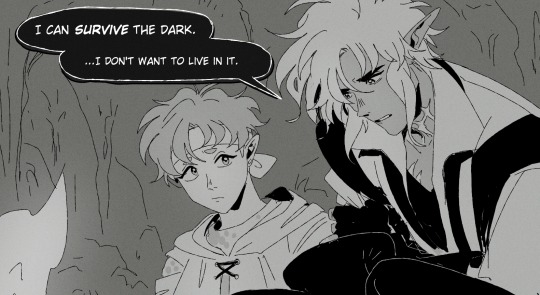
dandelion talks about how when he died it was like he was floating in a sea of black, and the paladin, lafavel, tries to talk him into finding a deity because he's worried about this warlock's soul*
*it doesn't work. dande gets defensively antagonistic
#dungeons and dragons#dnd#ocs#dnd art#dnd character#dnd oc#dandelion treehollow#lafavel adalhard#lafavel says i know you live a long time but you're not going to live forever#dande says well i have plenty of time#then an hour later forgets about the curse in his head that goes off if he wanders off on his own#and it does 30 psychic damage and almost kills him LOL#embarrassing behavior#dande's had some issues with the dark every since he got spirited away to meet his hag mom for the first time in a century and it was DARK#“it feels like that dark is following me...”#honestly very funny that the paladin is so concerned for dande's well being he's like bro you need jesus#he's not wrong#ravelers
462 notes
·
View notes
Text

Fyodor resurrecting for the first time: 🤷🏻♂️:3
#LET’s…f-ing GO? letsgo. 🩰🎶🎻 I GUESS ??#I keep making silly content about the first time his ability activated bc I cannot stomach the actual horrors that he likely endured !!!🫠#the way his ability reveal is making his centuries-long goal seem to make more sense for him…😩#I posted a comment reply on my tlkt0k video that I wanted to draw him as this meme so here we are !!#rat man is my entire brain#fyodor#fyodor dostoevsky#fyodor fanart#bsd#bsd fanart#bungou stray dogs#bungou stray dogs fanart#bungo stray dogs#bungo stray dogs fanart#fanart#anime#manga#bsd manga#ch 114.5#artists of tumblr#artists on tumblr#digital art#memes#bsd memes#guess I’ll live#guess i’ll die#meme redraw#meme prompt#drawing prompt#bsd fyodor
132 notes
·
View notes
Text

I think they both agree the opportunity has long since passed.
However with Kurt's pirate tendencies and Gambit being well Gambit, I can see them becoming quite the rum runners in their spare time.
#gambit is a terrible influence on kurt#kurt: they are gonna treat me as a bootlegger anyways might as well live the pirate dream in the process#gambit: and its not tecnically illegal so long as we stay 7 miles off the coast#kurt wagner#remy lebeau#nightcrawler#gambit x men#x men evolution#turn of the century au#mod talks
38 notes
·
View notes
Text
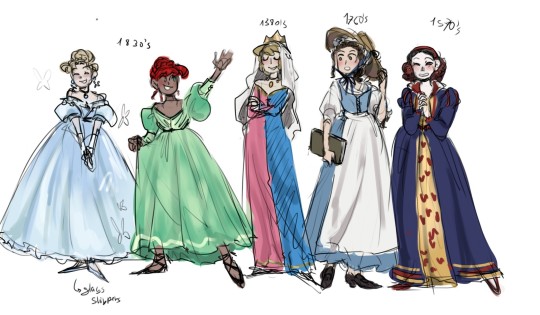
Disney princess with a bit more accurate outfits...
.
.
.
#art#fanart#disney#princess#historical fashion#i know cinderella is supposed to be set in the 1860s#but the 1830s suit the story so much better#like she can still have her hair bun and bangs#and full dress#and her stepmother can have those long regency-esque dresses#and ruffles#and the stepsisters can have those crazy haistyles#i'm sorry i went on a rant#also my little mermaid is more inspired in the live action#because the og movie can go either 1830s os 1890s puffs#but the live action has a more late 1830s aesthetic#still i think they did the actress dirty in term of clothes and hair#especially hair color#so nothing really pops out#don't ask me why snow white is in the 1570s#i also don't know#Sleeping Beauty is supposedly set somewhere in the late 14th century#so i chose the 1380s because i like it
95 notes
·
View notes
Text
The Hobbit’s official movie books really push the original timeline as the film one (despite 0 aging of characters in flashbacks pfft) BUT they also present Balin as the most ‘aged’ of the Company in both appearance and description at 178, despite Thorin — visibly far younger — being 17 years older than him.
It’s a conundrum, but I got an idea when I noticed Dwalin in the books supposedly lives to 340, even though a dwarf living to just 300 is supposed to be as rare as a human making it to 100! There’s been arguments that that was just a ‘typo’ on Tolkien’s part, but what if it wasn’t? What if we roll with that? Dwalin did look shockingly younger than Balin even though he’s just 9 years younger! That’s just 3 if you take it in human years!
So, using that 340 as inspiration and a base line, what if we say the direct line of Durin the Deathless plus the occasional offshoot like Dwalin just age slower than the typical dwarf? That their max baseline is closer to 300-350 or even 350-400 versus the usual 250-300? Because, if we go with, say, 400 as Thorin’s base max, suddenly we go from ‘Thorin should look older than Balin’ to ‘he’s in the human equivalent of his late 40s,’ and that seems much closer to the slightly aged up Richard Armitage we got in movies, doesn’t it?
This would also mean Thorin IS older than Balin despite their dynamic, but hey—sometimes your younger cousin is just wiser than you. 😂
#the hobbit#thorin oakenshield#balin#dwalin#been trying to pin this down to figure out how fast Thorin would age in a He Lives AU#if you’re curious? my take would make Thorin ‘late 40s’ in The Hobbit ‘early 60s’ in the LotR opening and ‘late 60s’ by the end#this of course all ignores visible ages in the flashbacks but how are you supposed to rectify those? Jackson should have used younger actor#there’s also a line in the movie books claiming Dwalin (and thus Balin) IS older but then you’ve got the book birthdates IN THE FILM so idk#not to mention the Sack of Erebor '2 centuries prior' HOW WAS THORIN ALIVE AND AWARE DURING THAT IF HE'S 'WELL YOUNGER' THAN A 178 YEAR OLD#haven’t really considered his nephews in this but perhaps they’d have a slightly more extended lifespan. just not Thorin long#I also like this because Armitage talks somewhere about Thorin 'feeling' older than he looks & that makes sense since he SHOULD look older#he's just aging slower than those around him. even among his own people.
41 notes
·
View notes
Text
On one level the book is about the life of a woman who is hardly more than a token in a great epic poem, on another it’s about how history and context shape how we are seen, and the brief moment there is to act between the inescapable past and the unknowable future.
Perhaps to write Lavinia Le Guin had to live long enough to see her own early books read in a different context from the one where they were written, and to think about what that means.
-Jo Walton
#thinking of how her last four novels between 2004 and 2008 show a progressive blossoming of interest in classical literary traditions#following nearly half a century's worth of a career where she seems to actively avoid the influence of classical or medieval europe#idk. but i think this explains annals of the western shore as much as lavinia.#she gets so interested in what it means to share the same stories across space and time (and class and gender and nationality)#to be united in a community by having the same poetry#and in such an obvious way thinking about classics as a discipline is an incredible way to work through that#and i do think its an interest that must come out of having witnessed her own work unite people in community across time#if you're talking about the way stories and poems bring people together across time...#i read the texts passed on to me by renaissance humanists and 19th century philologists and byzantine monks and late antique scribes...#and they're the same across time and space but they're also not#and to have seen her own work reach people across space and time and be the same but also not... that must have been incredible#so: did living long enough to see her own early books read in a different context and to think about what that means#drive her to think about classical literature as she clearly was for the better part of a decade?#mine#reception#anyway i gotta think about this and email [redacted] tomorrow
74 notes
·
View notes
Text
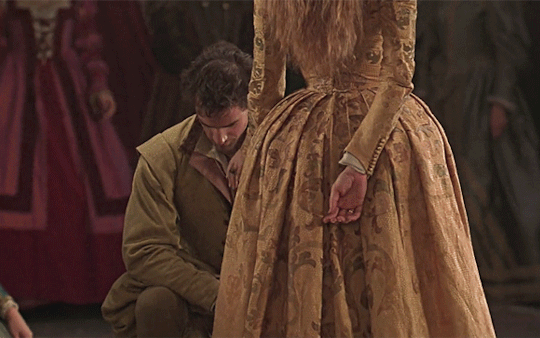
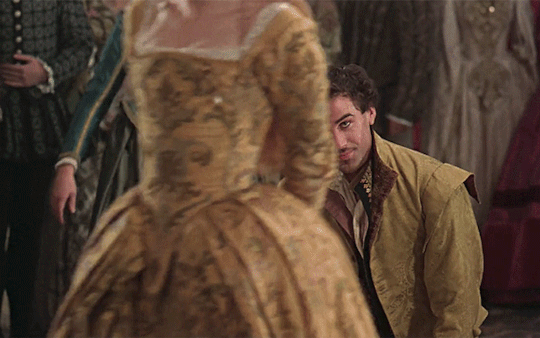
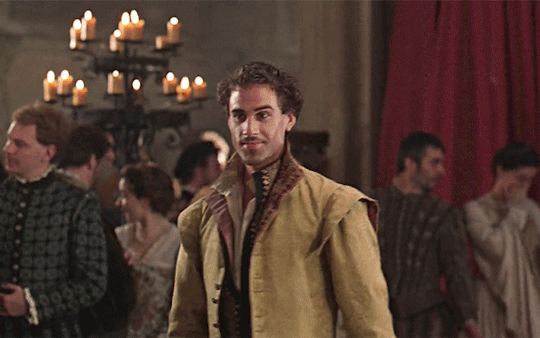

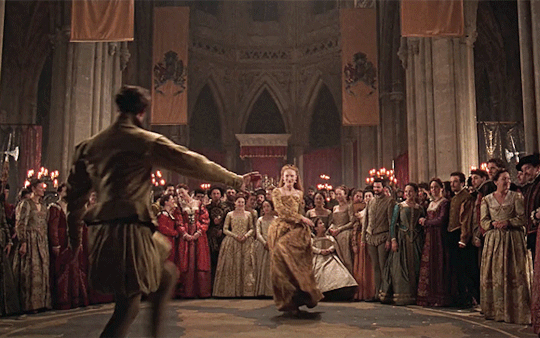
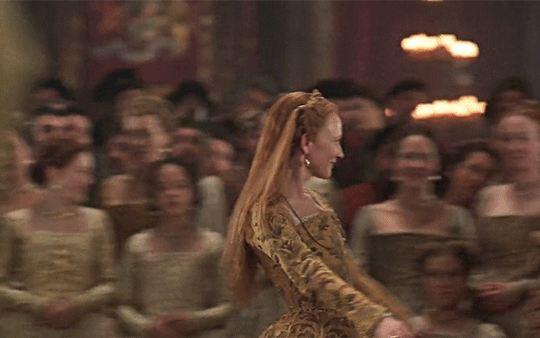
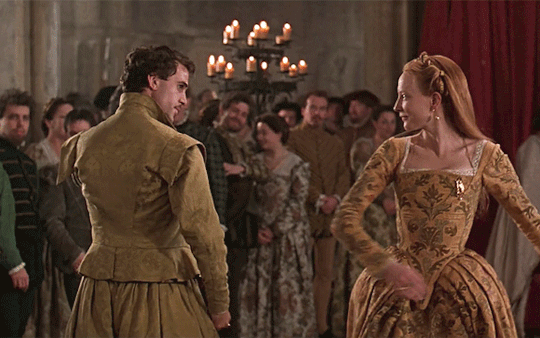
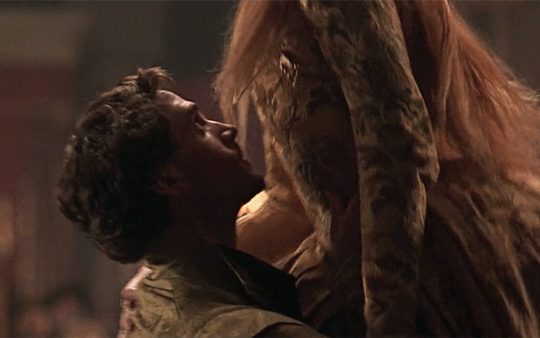
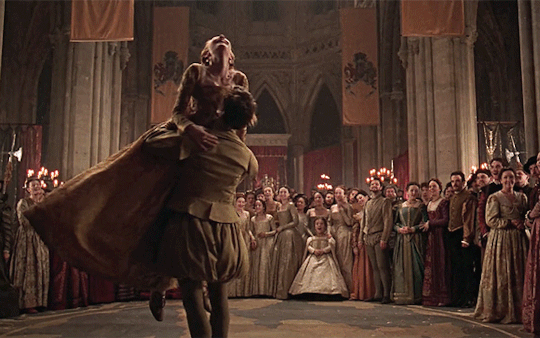
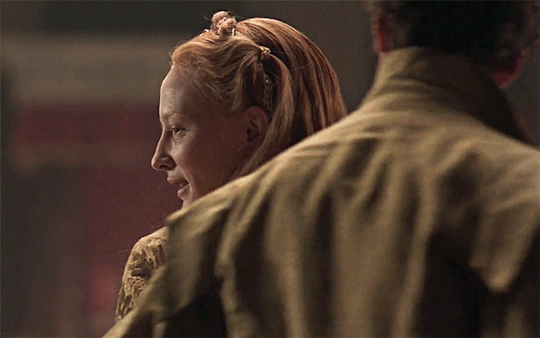
“She was twenty-five years old, vibrant and lively, with an ability to spin from imperiousness to intimacy that would keep a man guessing, pleasurably. If she was not beautiful then she had, like her mother, the ability to project the idea of it. Later in life, she told an ambassador that she had never in fact been a beauty, but had had the reputation of it in her day. ‘Comely rather than handsome, ’ the Venetian envoy had reported her a year or two before; ‘tall and well-formed, with a good skin, although swarthy, she has fine eyes.’ Robert too was ‘of a tall personage’, said the Venetian, who praised his ‘manly countenance’ though regretting his ‘somewhat brown’ complexion. He had hair and beard shading dark to auburn; the legs to stand up to the trying fashion for short breeches, with their padding and pinking, and their prominent codpieces; and the physique, when they danced together the daring Volta, to twirl Elizabeth high.” ⎯ Elizabeth and Leicester, Sarah Gristwood
#long post#perioddramaedit#perioddramasource#perioddramacentral#onlyperioddramas#weloveperioddrama#filmedit#elizabeth 1998#elizabeth tudor#robert dudley#cate blanchett#joseph fiennes#elizabeth x robert#elizabethan era#bess and robin#filmgifs#90's films#otp: for i have lived and so will die only hers#16th century#historical texts#tudor books#*gifs#*gifset#historical drama#gifshistorical#romancegifs#cinepix#bbelcher#otpsource#bblecher
146 notes
·
View notes
Text
Blind as a bat

#i need to think about more hcs for these two#I think Marshall sometimes joins Fionna on her adventures if he's interested enough (which is rare)#or if he wants to tick Gumball off by showing up without warning like 'heeeey bestie what are we doing today *smiles*'#because Gumball is usually the one who sends Fionna to do stuff outside the kingdom#i think adventuring/traveling in general is (as we say here in Brazil) always either 8 or 80 for Marshall#because he's lived so long and probably seen more than half of Ooo atp so he just doesn't care much about going out there anymore#he still likes hanging out with friends and going to concerts but travel to the other side of the island?#to see an event he's probably seen happen many times before over the centuries? with the conditions he has as a vampire?#and leave his cat alone??? nah he'd rather sleep all day#Fionna likes traveling. I think she'd be more interested on the fun and active parts of the trip like sports and festivals ig?#and also the stories. give her all the monster legends and mythologies and romances she loves them#I think Marshall would know places in Ooo that are known to be hella dangerous so when Fionna says she's going there he just goes#“oh? i'm going with you then I wanna see how long you survive there 👁️”#She usually does well without his help but he had to save her ass once or twice already#fionna and cake#adventure time fionna and cake#fionna and cake fanart#fionna campbell#marshall lee#adventure time fionna#fionna the human#adventure time marshall lee#adventure time#adventure time fanart
36 notes
·
View notes
Text
"It is too easy to dismiss [Leonor of Navarre] as an overambitious schemer who would do anything to obtain a crown, shedding the blood of her own siblings and her subjects in order to attain the throne. However, a deeper investigation of her long lieutenancy and ephemeral reign shows a woman who fought tenaciously to preserve her place but also worked tirelessly to administer a realm which was crippled by internal conflict and the center of the political schemes of France, Aragon, and Castile. She tried to broker peace, fight off those who opposed her, repair the wounds caused by conflict, protect the sovereignty of the realm, and keep the wheels of governance turning. Leonor was not always successful in achieving all of these aims but given the background of conflict and the lack of cooperation she received from all of her family members, bar her loyal husband, it is a huge achievement that she survived to wear the crown at all. Many writers have argued that Leonor deserved the troubled lieutenancy, personal tragedies, an ephemeral reign, and a blackened reputation, basing their assumption that she committed a crime that cannot be [conclusively] proven. However, a more fitting description of her would be that of a resolute ruler who successfully overcame a multitude of challenges in order to survive in a difficult political landscape and gain a hard-fought throne.”
-Elena Woodacre, "Leonor of Navarre: The Price of Ambition", Queenship, Gender and Reputation in the Medieval and Early Modern West, 1060-1600 (Edited by Zita Eva Rohr and Lisa Benz)
#historicwomendaily#leonor of navarre#15th century#Navarrese history#my post#I mean...the crime can't be explicitly 'proven' but Leonor DID have the means motive and opportunity; she had the most to gain;#the timing was incredibly convenient for her; and most contemporaries believed she was responsible.#She *did* ultimately act against her brother [Carlos] and sister [Blanca]#Though of course the fact remains that:#1) The final responsibility lies with Juan the Faithless: he was the King; the one in power; and the one who rejected Navarre's succession#Blanca herself - while criticizing Leonor and Gaston - placed the ultimate blame on their father as her 'principal...destructor'#All three siblings were reacting to an unconventional disruption in the system caused by Juan & their actions should be judged accordingly.#2) I am hesitant to believe accusations of 'poison' as a cause of murder given how that was commonly used to slander controversial women#and given how it contributed to the dichotomy of Blanca as a tragic beautiful heroine and Leonor as her scheming ambitious sister#3) Even if Leonor DID commit the crime (imo she was at the very least complicit in it) she is still worthy of a reassessment.#I don't think it's fair for it to define her entire identity#Because it certainly did not define her life - she lived for decades before and would live for decades after#It was on the whole one of the many series of obstacles and challenges she had to face before she succeeded in ascending the throne.#The fact that she died so soon after IS ironic but it is in equal parts tragic. And we don't know what Leonor herself felt about it:#Did she think it was a hollow victory? Or did she feel nothing but satisfaction that she died as the Queen of Navarre? We'll never know.#Whatever the case: given her circumstances the fact that she survived to wear the crown itself was an achievement#It's funny because Woodacre parallels Leonor to Richard III in terms of 'blackened' reputations for 'unproven' (...sure) crimes#(thankfully she admits Richard has been long-rehabilitated; what she doesn't bring herself to admit is that he's now over-glorified)#But I don't think this parallel works at all for the exact reasons she uses to try and reassess Leonor#Namely: Richard was the one in power. He was the King. The ultimate blame for what happened to his nephews was his own.#and moreover: Richard's actions against the Princes DID define his reign and were exactly what provoked opposition to his rule.#Any so-called 'rehabilitation' that doesn't recognize and emphasize this is worthless#also if we want to get specific: the Princes were literal children who did nothing and were deposed in times of peace.#Carlos and Blanca were adults with agency and armies and Leonor's actions against them took place in the middle of a civil war#So ultimately I think Leonor's case is fundamentally very different and I don't think her comparison holds well at all
19 notes
·
View notes
Text
it’s so hard for me to imagine alucard in a modern au . . . like what in the world is he doing in the city?!
#that distinguished man has no business in the 21st century#the lack of manners would eat him alive#like yeah he has a mouth on him and can dish shit back but#adri can only do that for so long before wondering if the world’s truly gone to shit#technically a modern version of alucard exists . . .#genya arikado is right in front of me but im not feeling him lol . he seems like a completely different person#who STILL looks far too old fashioned to be living in 2040 whatever time#idk i just . . . i’ve been thinking of writing him in a modern setting but i just can’t wrap my head around that#you mean this man would be going to shake shack? driving cars? using a credit card instead of ducat coins?!?!!!#no way . that man belongs in the 1400s for sure lol#wow i really ended up running my mouth 😭 anyway i love that man just as he is!#꒰ঌ rambles.ᐟ ໒꒱#ৎ୭ ⨾ alucard.ᐟ#꒰ঌ castlevania.ᐟ ໒꒱#alucard#adrian tepes#adrian fahrenheit tepes#alucard castlevania#castlevania netflix#castlevania#alucard tepes
21 notes
·
View notes
Text
I used to like saying "gender is a social construct," but I stopped saying that because people didn't tend to react well - they thought that I was saying gender wasn't real, or didn't matter, or could be safely ignored without consequences. Which has always baffled me a bit as an interpretation, honestly, because many things are social constructs - like money, school, and the police - and they certainly have profound effects on your life whether or not you believe in them. And they sure don't go away if you ignore them.
Anyway. What I've taken to saying instead is, "gender is a cultural practice." This gives more of a sense of respect for the significance gender holds to many people. And it also opens the door to another couple layers of analysis.
Gender is cultural. It is not globally or historically homogeneous. It shifts over time, develops differently in different communities, and can be influenced by cross-cultural contact. Like many, many aspects of culture, the current status of gender is dramatically influenced by colonialism. Colonial gender norms are shaped by the hierarchical structure of imperialist society, and enforced onto colonized cultures as part of the project of imperial cultural hedgemony.
Gender is practiced. What constitutes a gender includes affects and behaviors, jobs or areas of work, skillsets, clothing, collective and individual practices of gender affiliation and affirmation. Any or all of these things, in any combination, depending on the gender, the culture, and the practitioner.
Gender encompasses shared cultural archetypes. These can include specific figures - gods and goddesses, mythic or fictional characters, etc - or they can be more abstract or general. The Wise Woman, Robin Hood, the Dyke, the Working Man, the Plucky Heroine, the Effete Gay Man, etc etc. The range of archetypes does not circumscribe a given gender, that is, they're not all there is to gender. But they provide frameworks and reference points by which people relate to gender. They may be guides for ways to inhabit or practice a gender. They may be stereotypes through which the gendered behavior of others is viewed.
Gender as a framework can be changed. Because it is created collectively, by shared acknowledgement and enforcement by members of society. Various movements have made significant shifts in how gender is structured at various times and places. The impact of these shifts has been widely variable - for example, depending on what city I'm in, even within my (fairly culturally homogeneous) home country, the way I am gendered and reacted to changes dramatically. Looping back to point one, we often speak of gender in very broad terms that obscure significant variability which exists on many scales.
Gender is structured recursively. This can be seen in the archetypes mentioned above, which range from extremely general (say, the Mother) to highly specific (the PTA Soccer Mom). Even people who claim to acknowledge only two genders will have many concepts of gendered-ways-of-being within each of them, which they may view and react to VERY differently.
Gender is experienced as an external cultural force. It cannot be opted out of, any more than living in a society can be opted out of. Regardless of the internal experience of gender, the external experience is also present. Operating within the shared cultural understanding of gender, one can aim to express a certain practice of gender - to make legible to other people how it is you interface with gender. This is always somewhat of a two-way process of communication. Other people may or may not perceive what you're going for - and they may or may not respect it. They may try to bring your expressed gender into alignment with a gender they know, or they might parcel you off into your own little box.
Gender is normative. Within the structure of the "cultural mainstream," there are allowable ways to practice gender. Any gendered behavior is considered relative to these standards. What behavior is allowed, rewarded, punished, or shunned is determined relative to what is gender normative for your perceived gender. Failure to have a clearly perceivable gender is also, generally, punished. So is having a perceivable gender which is in itself not normative.
Gender is taught by a combination of narratives, punishments, and encouragements. This teaching process is directed most strongly towards children but continues throughout adulthood. Practice of normatively-gendered behaviors and alignment with 'appropriate' archetypes is affirmed, encouraged, and rewarded. Likewise 'other'- gendered behavior and affinity to archetypes is scolded, punished, or shunned. This teaching process is inherently coercive, as social acceptance/rejection is a powerful force. However it can't be likened to programming, everyone experiences and reacts to it differently. Also, this process teaches the cultural roles and practices of both (normative) genders, even as it attempts to force conformity to only one.
Gender regulates access to certain levers of social power. This one is complicated by the fact that access to levers of social power is also affected by *many* other things, most notably race, class, and citizenship. I am not going to attempt to describe this in any general terms, I'm not equipped for that. I'll give a few examples to explain what I'm talking about though. (1) In a social situation, a man is able to imply authority, which is implicitly backed by his ability to intimidate by yelling, looming, or threatening physical violence. How much authority he is perceived to have in response to this display is a function of his race and class. It is also modified by how strongly he appears to conform to a masculine ideal. Whether or not he will receive social backlash for this behavior (as a separate consideration to how effective it will be) is again a function of race/class/other forms of social standing. (2) In a social situation, a woman is able to invoke moral judgment, and attempt to modify the behavior of others by shame. The strength of her perceived moral authority depends not just on her conformity to ideal womanhood, but especially on if she can invoke certain archetypes - such as an Innocent, a Mother, or better yet a Grandmother. Whether her moral authority is considered a relevant consideration to influence the behavior of others (vs whether she will be belittled or ignored) strongly depends on her relative social standing to those she is addressing, on basis of gender/race/class/other.
[Again, these examples are *not* meant to be exhaustive, nor to pass judgment on employing any social power in any situation. Only to illustrate what "gendered access to social power" might mean. And to illustrate that types of power are not uniform and may play out according to complex factors.]
Gender is not based in physical traits, but physical traits are ascribed gendered value. Earlier, I described gender as practiced, citing almost entirely things a person can do or change. And I firmly believe this is the core of gender as it exists culturally - and not just aspirationally. After the moment when a gender is "assigned" based on infant physical characteristics, they are raised into that gender regardless of the physical traits they go on to develop (in most circumstances, and unless/until they denounce that gender.) The range of physical traits like height, facial shape, body hair, ability to put on muscle mass - is distributed so that there is complete overlap between the range of possible traits for people assigned male and people assigned female. Much is made of slight trends in things that are "more common" for one binary sex or the other, but it's statistically quite minor once you get over selection bias. However, these traits are ascribed gendered connotations, often extremely strongly so. As such, the experience of presented and perceived gender is strongly effected by physical traits. The practice of gender therefore naturally expands to include modification of physical traits. Meanwhile, the social movements to change how gender is constructed can include pushing to decrease or change the gendered association of physical traits - although this does not seem to consistently be a priority.
Gender roles are related to the hypothetical ability to bear children, but more obliquely than is often claimed. It is popular to say that the types of work considered feminine derive from things it is possible to do while pregnant or tending small children. However, research on the broader span of human history does not hold this up. It may be true of the cultures that gave immediate rise to the colonial gender roles we are familiar with - secondary to the fact that childcare was designated as women's work. (Which it does not have to be, even a nursing infant doesn't need to be with the person who feeds it 24 hours a day.) More directly, gender roles have been influenced by structures of social control aiming for reproductive control. In the direct precursors of colonial society, attempts to track paternal lineage led to extreme degrees of social control over women, which we still see reflected in normative gender today. Many struggles for women's liberation have attempted to push back these forms of social control. It is my firm opinion that any attempt to re-emphasize childbearing as a touchstone of womanhood is frankly sick. We are at a time where solidarity in struggle for gender liberation, and for reproductive rights, is crucial. We need to cast off shackles of control in both fights. Trying to tie childbearing back to womanhood hobbles both fights and demeans us all.
Gender is baked deeply enough into our culture that it is unlikely to ever go away. Many people feel strongly about the practice of gender, in one way or another, and would not want it to. However we have the power to change how gender is structured and enforced. We can push open the doors of what is allowable, and reduce the pain of social punishment and isolation. We can dismantle another of the tools of colonial hedgemony and social control. We can change the culture!
#Gender theory#I have gotten so sick of seeing posts about gender dynamics that have no robust framework of what gender IS#so here's a fucking. manifesto. apparently.#I've spent so long chewing on these thoughts that some of this feels like. it must be obvious and not worth saying.#but apparently these are not perspectives that are really out in the conversation?#Most of this derives from a lot of conversations I've had in person. With people of varying gender experiences.#A particular shoutout to the young woman I met doing collaborative fish research with an indigenous nation#(which feels rude to name without asking so I won't)#who was really excited to talk gender with me because she'd read about nonbinary identity but I was the first nb person she'd met#And her perspective on the cultural construction of gender helped put so many things together for me.#I remember she described her tribe's construction of gender as having been put through a cookie cutter of colonial sexism#And how she knew it had been a whole nuanced construction but what remained was really. Sexist. In ways that frustrated her.#And yet she understood why people held on to it because how could you stand to loose what was left?#And how she wanted to see her tribe be able to move forward and overcome sexism while maintaining their traditional practices in new ways#As a living culture is able to.#Also many other trans people of many different experiences over the years.#And a handful of people who were involved in the various feminist movements of the past century when they had teeth#Which we need to have again.#I hate how toothless gender discourse has become.#We're all just gnawing at our infighting while the overall society goes wildly to shit#I was really trying to lay out descriptive theory here without getting into My Opinions but they got in there the last few bullet points#I might make some follow up posts with some of my slightly more sideways takes#But I did want to keep this one to. Things I feel really solidly on.
17 notes
·
View notes
Text
So considering what we know about Chima and the Wyldness and all that blah blah blah, I wonder if after the Merge, a group of Serpentine, maybe a few hundred, would've ventured to the Wyldness to try reconnect with their ancient roots (given the hypothesized idea of the FSM bringing the Serpentine from Chima/the Wyldness.)
I can imagine maybe they find the ancient remains of Serpentine lands, maybe there exists modern day Serpentine in the Wyldness who evolved differently from the ones we know due to conditions, and thus work in different ways from OUR Serpentine.
Maybe the reason Ninjago Serpentine are divided as Tribes has something to do with the Ancient Ways once spoken of centuries ago by their ancient ancestors, back when the Tribes were different animal species, not Serpentine species.
#I have many ideas on this idea now#which can lead to a TON of new Serpent guys#i also think u could do a rlly neat allegory#smth smth being taken from your land centuries ago and getting to reunite with it and live a life your ancient ancestors once did.#idkkkk i think theres some meaningful stories to be told here#maybe modern ninjago serpentine have a hard time with chi because they developed their own powers based on the magic essence of ninjago#and thus chi which is moreso the accidental essence of the wyldness#works weirdly for them#whether its weaker#or just doesnt work#idk#i feel like chi would likely only work on those exposed to its essence for a long enough time#like a species evolved to withstand it#so like the ninja? they cant use chi bc ninjago doesnt carry the essence of chi#i have great ideas btw#ninjago#ninjago dragons rising#raine's rambles#legends of chima#lego legends of chima
52 notes
·
View notes
Note
But do we live? I don't mean survive, I mean live. Is it worth it?
Asking for a very scared teenage trans masc that's definitely not me
it's so worth it man. and yeah we do live. some of us get out of our old houses and some of us get married to people who love us for who we truly ate and some of us get new jobs and some of us start cleaning out our old wardrobes and some of us join bands and start organizations. so we do live. we have always wanted to live, and we will. i can tell you that nothing is permanent in life, but that includes the bad times. you will make it out. the life you've been wishing for? the end of the darkness you see in your daydreams? it will happen. maybe slowly but it will happen. and when it happens you will sleep soundly and wear what you like and people will notice your name and your voice for how cool they are. ok
#asks#hey dude from a guy who was in your spot. love you. you can do it k? you're doing amazing. and it'll be good i promise#there is a lot of emphasis on the bad side of life and so so many people trying to do shit to us and yet. even in the 1800s the 1900s#hell. centuries before that. we lived. we loved. we ate strawberries with our friends in the kitchen and we laughed about it.#so yeah. we'll do it again and again.#if nothing else. survive. survive and then live#live!! live for yourself!! you didn't survive this long to not let yourself grow into the person you've always wanted to become
19 notes
·
View notes